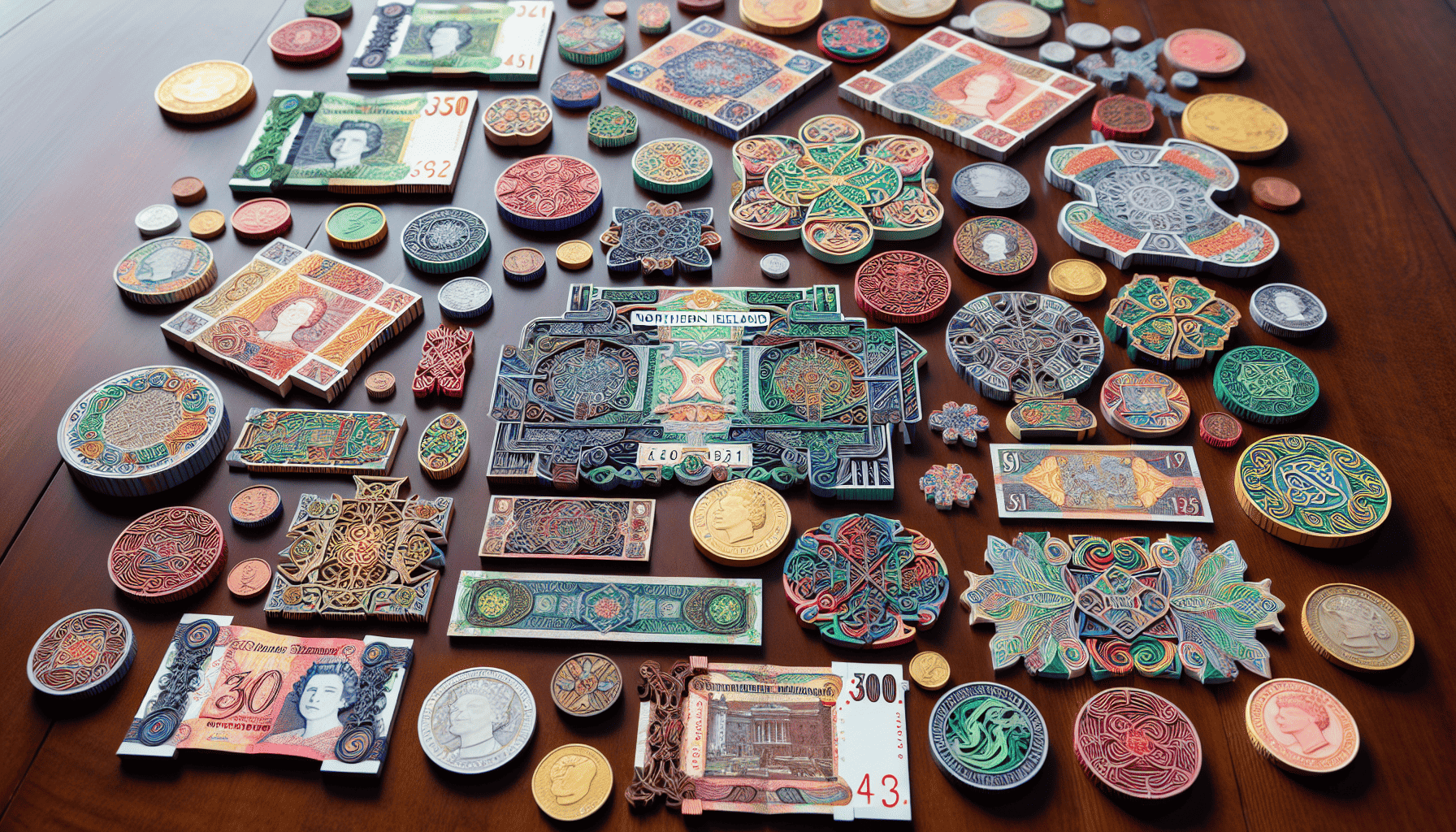Welcome to the intricate world of Northern Ireland’s currency! A labyrinth where local banks issue their unique banknotes, adding nuanced layers to the traditional British Pound Sterling. This comprehensive guide is your Sherpa, leading you through the fascinating terrain of northern ireland currency system, exchange rates, and safe financial practices.
Key Takeaways
Northern Ireland uses the British Pound Sterling as its official currency, with local banks issuing their own unique banknotes.
Polymer notes have recently been introduced to improve security and durability, featuring state-of-the art features such as holograms and microlettering.
It is important to plan finances before travelling by bringing proper currency (Pound Sterling), monitoring exchange rates & confirming foreign transaction fees with credit card provider.
Currency Overview in Northern Ireland

The British Pound Sterling serves as the official currency in Northern Ireland. Yet, you’ll often encounter banknotes bearing the insignia of Ulster Bank, Danske Bank, or Bank of Ireland. These local entities possess the authority to circulate their exclusive banknotes in £5, £10, £20, £50, and £100 denominations. Their distinct designs infuse a unique local touch into the conventional British Pound Sterling.
Such an arrangement of local banks issuing notes is rather uncommon. This distinctive system is shared only by Northern Ireland, Scotland, and the Channel Islands. Thus, your spending in Northern Ireland will be in UK pounds, albeit with an Irish flair!
Legal Tender Across the Region
When it comes to legal tender, Northern Ireland’s banknotes hold an interesting position. They are recognized for the settlement of debts throughout the UK, making them as useful as the Bank of England notes. However, they are not considered legal tender outside Northern Ireland. This may seem like a riddle wrapped in a mystery, but it’s just another intriguing aspect of Northern Ireland’s financial landscape.
A noteworthy development in recent years has been the shift from paper to polymer notes. The advantages of polymer notes include:
Waterproof
Dirtproof
More durable
Secure
Recyclable
These features extend the lifespan of the notes and promote environmental sustainability in comparison to traditional paper notes. However, polymer notes also present a few challenges, such as sensitivity to extreme temperatures and handling issues.
Polymer and Paper Notes
At the heart of Northern Ireland’s currency evolution is the transition from paper to polymer notes. Polymer notes are more resilient and secure, while paper notes are still accepted but are being phased out. The transition has been gradual, starting with the Ulster Bank £50 note on June 23, 2021, and the £5 and £10 notes on September 30, 2023. This move to polymer notes is driven by their increased durability, longevity, and improved security features that make them more difficult to counterfeit.
The polymer notes come equipped with state-of-the-art security features including:
Holograms
Raised print
Microlettering
UV ink
These features make them a hard nut to crack for counterfeiters. This commitment to innovation and security is a shining example of the northern bank sector in Northern Ireland, demonstrating dedication to addressing the changing needs of the public.
The Role of Ulster Bank and National Westminster Bank Plc
Ulster Bank and National Westminster Bank Plc hold significant roles in Northern Ireland’s unique banking landscape. Bank of Ireland and Ulster Bank are two banking entities that hold the authority to release banknotes in Northern Ireland. The third being First Trust Bank. Ulster Bank has been issuing its own banknotes since its establishment, a tradition as deeply rooted in Northern Ireland’s history as the Giant’s Causeway.
Established in 1836, Ulster Bank has been an integral part of the region’s banking sector. It issues a variety of banknotes, including the widely recognized £20 note. National Westminster Bank Plc, the parent company of Ulster Bank, does not issue separate banknotes but does so under the Ulster Bank branding. These banks, with their unique banknotes, contribute to the rich tapestry of Northern Ireland’s currency system.
Handling Money Transactions
Much like many other regions, Northern Ireland boasts an efficient system for managing foreign transactions. These transactions require conversions to the Pound Sterling at the prevailing exchange rate. So, whether you’re buying a pair of traditional Irish dancing shoes or paying for a guided tour of the Titanic Belfast, you’ll be using the Pound Sterling (£) for all transactions.
The determination of exchange rates for these transactions, also known as currency conversions, is as intricate a process as weaving a Celtic knot. The exchange rates are typically based on the Bank of England’s rates, with amounts in sterling determined at the time of the transaction according to the current exchange rate.
Foreign Transactions and Exchange Rates
Navigating the world of foreign transactions and exchange rates can feel like trying to traverse the Giant’s Causeway in the fog. However, with the right understanding, it becomes a walk in the park. The exchange rate of the British pound relative to other major currencies fluctuates depending on various factors. That’s why it’s recommended to consult reliable sources such as OFX or XE for the most up-to-date rates.
Exchange rates are determined by a variety of elements, including:
Inflation
Interest rates
Government/public debt
Political stability
Economic productivity
Significant external occurrences like Brexit
The Bank of England computes and makes available daily figures for Effective Exchange Rate Indices (ERIs) for significant international currencies, including sterling.
Bear in mind, though, that foreign transactions in Northern Ireland may incur additional fees. These fees vary depending on the card and bank, so it’s always a good idea to check with your bank.
Widely Accepted Payment Methods
Despite its deep historical roots, Northern Ireland keeps pace with modern payment methods. Credit cards, particularly Visa and MasterCard, enjoy wide acceptance, proving to be a versatile tool for travelers akin to a Swiss army knife. Debit cards are also commonly accepted, used by many businesses, from markets to pubs.
And for those who prefer a touch of the modern, Northern Ireland embraces the digital age with open arms. Digital payment methods such as Apple Pay and Google Wallet are extensively accepted, making transactions as easy as a tap of the phone.
Currency Exchange Services
Northern Ireland offers a plethora of options for currency exchange services. You can access these services at a number of locations, including:
Banks
Post offices
Hotels
Tourist offices
Bureaux de Change
It’s like having a personal currency exchange concierge at your service.
Hotels in Northern Ireland provide currency exchange services to their patrons. Bureaux de Change, dedicated currency exchange offices, are situated in various locations across Northern Ireland. They offer convenient services, albeit with higher commissions and fees, but when you’re in need of quick cash, they can be a lifesaver.
Issuing Banks and Their Notes
The Northern Ireland banknotes, issued by local banks, are like colorful pieces of a financial jigsaw puzzle. Each banknote, with its unique design and features, tells a story. The Bank of England issues banknotes in 6 different denominations:
1 pound
5 pounds
10 pounds
20 pounds
50 pounds
100 pounds
All the notes have similar colourful designs and security features to protect them from forgery. However, the 1 pound note is no longer distributed by any bank in Northern Ireland.
Some banknotes, like the paper 50 and 100 pound notes issued by Ulster Bank, have been retired from the game and are no longer accepted as legal tender. The First Trust Bank notes have been superseded by Bank of England banknotes and became invalid as legal tender after June 30, 2022. Yet, the design of current banknotes, from the 5 pound note issued by Bank of Ireland and Ulster Bank to the euro notes featuring generic depictions of Northern Irish people, adds color and character to the currency system.
Unique Features of Local Banknotes
Northern Ireland banknotes are not just currency; they are canvases showcasing the region’s cultural heritage. They feature designs that illustrate native creatures, plants, and cultural elements, reflecting local music, culture, migration, indigenous species, and other aspects of Northern Irish culture. It’s like holding a piece of Northern Ireland’s rich tapestry in your hands.
Landmarks of Northern Ireland, from the bustling Belfast Harbour to serene rural landscapes, find a place on these banknotes. They also represent historical events, such as the migration of animals and people, dwelling in nature, and the accomplishments of women from Northern Ireland. The £10 banknote, commemorating traditional food, native plants, and animals of Northern Ireland, and the polymer £50 note, acknowledging the accomplishments of women, are particularly distinctive.
Preparing Your Finances for Travel
Preparing your finances for a trip to Northern Ireland is akin to packing for a journey. You need to know what to bring, how much to bring, and how to use it when you arrive. The first item on your financial packing list should be the Pound Sterling (GBP), the recommended currency for use in Northern Ireland.
Keeping an eye on the exchange rate between your home currency and the Northern Ireland pound is as crucial as checking the weather forecast before your trip. At present, the exchange rate between the US dollar and the Northern Ireland pound is 1 USD = 0.73 GBP, but it’s always prudent to verify the most recent rates prior to embarking on a journey.
Also, remember that credit cards, especially Visa and MasterCard, are widely accepted, making them a valuable travel companion. However, don’t forget to check with your credit card provider about potential fees associated with foreign transactions.
Protecting Against Loss and Theft
Just like in any travel destination, it is paramount to secure your funds while traveling in Northern Ireland. Think of it as having an invisible shield around your wealth. Here are some tips to keep your money safe:
Use discreet leg wallets or money belts to hide away travel money and keep cash out of sight.
Refrain from carrying large sums of money.
Be mindful of commonplace travel scams.
In the unfortunate event of a lost or stolen credit card, a swift response can prevent a mountain of headaches. Contact the Card Services team at Freephone 0800 0391 140 or at 028 9033 0099, which is available 24 hours a day. If valuables are stolen, report the theft to the Police Service of Northern Ireland promptly and provide a comprehensive description. Vigilance and quick action are the best defenses against loss and theft.
Summary
Navigating Northern Ireland’s unique currency landscape can be as exhilarating as exploring its lush green landscapes and dramatic coastlines. From local banks issuing their banknotes to the use of polymer notes, Northern Ireland’s currency system is a tapestry of tradition and innovation. By understanding the intricacies of currency, exchange rates, and safe financial practices, you are well-equipped to make your journey through Northern Ireland a memorable and hassle-free experience.
Frequently Asked Questions
Does Northern Ireland have its own currency?
Northern Ireland does not have its own currency; it is part of the United Kingdom and uses the pound sterling (£) as its official currency. Those travelling to both the North and South of Ireland must have both pound sterling (£) and euro (€) on hand.
Can I use English money in Northern Ireland?
Yes, you can use English money in Northern Ireland, as Bank of England banknotes are permitted to be used there.
Can you accept Northern Ireland banknotes in England?
Yes, you can accept Northern Ireland banknotes in England as they are readily accepted there.
What is the difference between polymer and paper notes?
Polymer notes are more durable, secure and eco-friendly than paper notes, which are gradually being replaced.
What precautions should I take to protect against loss and theft while traveling in Northern Ireland?
To protect against loss and theft while traveling in Northern Ireland, use discreet leg wallets or money belts to hide away travel money, keep cash out of sight, refrain from carrying large sums of money, and be mindful of commonplace travel scams.

